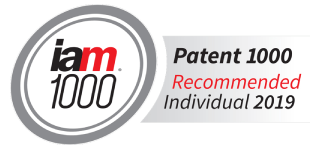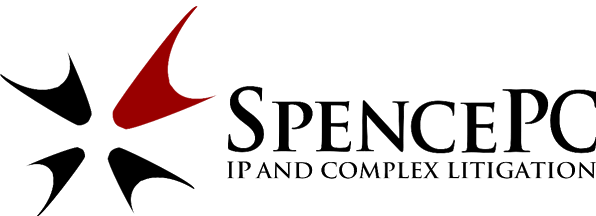Services
Practice Areas
Why SpencePC?
Clients choose SpencePC because we do outstanding work for fair compensation. Unlike our competitors, we encourage the use of alternative-fee agreements that more closely align our clients’ interests with the Firm’s interests. As a result, our clients pay only for the value they receive.
Our Philosophy
Our philosophy is simple: be outstanding and offer a unique value proposition. Hourly billing creates the wrong incentive for attorneys to work longer, not smarter. Instead, we encourage alternative-fee arrangements that reward success and efficiency. By doing so, our attorneys remain focused on obtaining the best results for our clients in the most cost-efficient manner.
Our Skills
We are attorneys who specialize in intellectual property and complex litigation. We hold science, engineering, and law degrees from the nation’s top schools. Following our education, each of us received years of additional training from prestigious, top-tier law firms. Our billing model ensures we remain focused on obtaining the best results in the most cost-efficient manner.
Associations & Accolades
Supreme Court Considers Booking.com Trademark Dispute
By: AJ Wenn, Daniel Hess
Once a business purchases an internet domain name it can be rest assured that it—and it alone—owns and uses that specific domain name. Conversely, a business’ trademark is different: the business has to continuously use the trademark in commerce, but in return gains the incredible advantage of preventing competitors from using a similar mark in commerce. Almost every business wants its trademark to also be its domain name for consistency, but these remain distinctive property rights.
Presently, the United States Supreme Court is set to hear a case involving Booking.com: a company that openly markets itself as “Booking.com” where the “.com” is intended to be part of the company’s name and trademark. The Lanham Act makes it clear that generic terms cannot be registered as trademarks. 15 U.S.C. § 1051. Generic terms are commonly understood as words or symbols that communicate the type of product or service offered for sale. However, a question arises as to whether an online business can create a protectable trademark by adding an internet domain, such as “.com,” to an otherwise generic mark. The Supreme Court seeks to address this issue in U.S. Patent & Trademark Office v. Booking.com B.V. , No. 19-46, where Booking.com is attempting to register a trademark on its name.
Previously, Booking.com filed four trademark applications for BOOKING.COM. Finding the trademarks generic and unprotectable, a USPTO examiner rejected these applications. The USPTO concluded that the company did not show the marks acquired secondary meaning and were merely descriptive. The TTAB then affirmed these rejections.
Booking.com appealed to the U.S. District for the Eastern District of Virginia, arguing that BOOKING.COM was eligible for protection because it was descriptive. The court agreed and held that BOOKING.COM had acquired secondary meaning due to its popularity and consumer recognition.
The USPTO appealed to the Fourth Circuit Court, arguing that adding a domain combined with an otherwise generic term could not generate a protectable mark. However, the circuit court affirmed the district court, relying in part on evidence showing consumers recognized BOOKING.COM as a brand rather than a generic service granting it secondary meaning.
The case was subsequently appealed and is now in the hands of the U.S. Supreme Court, who must decide if adding an internet domain to an otherwise generic term, like “booking,” can create a protectable trademark. Oral arguments were supposed to be heard earlier this week, but were postponed due to the coronavirus pandemic. It is unclear when oral arguments will resume.
The ruling in this case may affect the domain names and branding of businesses in a variety of ways. If Booking.com succeeds, it would be able to exclude competitors from using similar domain names and logos, such as, booking.biz, booking.co, booking.inc, or booking.org. Booking.com would also be able to exclude similar variants of its name, including, ebooking.com, bookingnow.com, booktrips.com, etc. The “doctrine of foreign equivalents” would also apply to these examples, which extends trademark protection beyond the English language 1 and enables Booking.com to exclude domain names with common meanings in foreign languages.
In respect to trademark prosecution, if a business currently has a trademark or logo including an internet domain, this case could create an avenue for registration. For example, one could overcome an office action by arguing a mark with “.com” has acquired secondary meaning and is recognized by consumers as a brand, thereby securing a registration.
Conversely, if the USPTO wins the case, prosecution at the Trademark Office will remain largely unchanged, and internet domains will not provide an avenue to receive a registration. Similarly, one would not be able to enforce a generic trademark that contains an internet domain.
As most commercial businesses own web domain names, the outcome of this case could be crucial to the marketing and online advertising strategies of various organizations. Upon issuance of the final decision, SpencePC will publish a follow up article to address any substantive changes to the law. If you have any questions about trademark prosecution or litigation, please feel free to contact SpencePC. We are also happy to discuss any IP issues you may face, including patent litigation, patent applications and prosecution, trademark applications and prosecution, copyright filings, trade secrets, or other complex litigation matters.
1 TMEP 1207.01(b)(vi)
The post Supreme Court Considers Booking.com Trademark Dispute appeared first on SpencePC.











